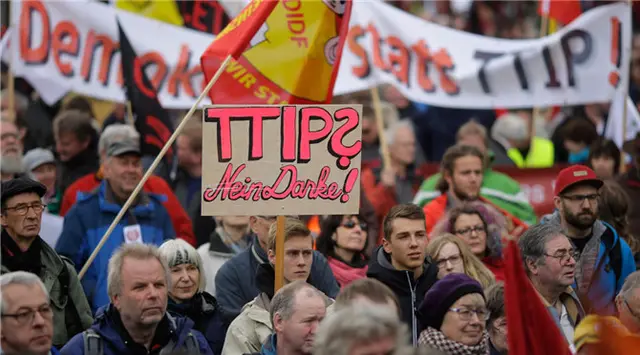U.S. President Barack Obama is defending his transatlantic trade deal on a visit to Germany though tens of thousands of Germans took to the street to oppose the bill.
In a joint press conference in the northern German city of Hanover, Obama said it is "indisputable" that the Transatlantic Trade and Investment Partnership (TTIP) will make both the EU and U.S. economy stronger and more competitive compared to other regions of the world.
"The United States and the European Union need to keep moving forward with the TTIP," he said after holding talks with German Chancellor Angela Merkel in his final visit to Germany as the U.S. president.
During the trip, Obama opened an industrial technology fair and held talks with Merkel and other European leaders.
However, Obama's trip, which was intended to lend momentum to flagging efforts to see the world's biggest trade pact finalized this year, was embarrassed by the march and rally outside Hanover's opera house.
A loose coalition of trade unions, environmentalists and consumer protection groups said they drew a crowd of 90,000 to take part in the demonstration. Police mobilized a large force to keep order and put attendance at 35,000.
Organizers handed out flags saying "Yes we can - stop TTIP," referring to a slogan used during Obama's election campaign.
A recent survey found that public support for the agreement have dropped sharply in both Germany and the United States in recent years. Concerns of the opponents include declines in consumer and labor protection, environment standards as well as the secrecy of the negotiations.
Support for the TTIP, which is said to create the world's largest free trade area with 800 million people, has eroded among Germans and Americans.
According to a survey done by Germany's Bertelsmann Foundation, one in three Germans now rejects the TTIP. Among U.S. citizens, despite a growing support for free trade in general, only 15 percent favor it, a sharp decline from more than 50 percent in 2014.
People at the demonstration said the march was not about anti-American sentiment. U.S. citizens were among those taking part in the march, holding up a sign reading "Americans against TTIP."
Obama said differences between the two sides are narrowing and he's confident that the agreement will be completed finally although he cannot anticipate that the deal will be ratified by the end of this year.
Merkel also defended the free trade agreement under negotiations between the U.S. and European Union on Sunday, saying the agreement would benefit the economy on both sides of the Atlantic.
"It is very helpful to allow our economy in Europe to grow, It's important for the German economy, it's important for the European economy," said Merkel, adding that both the EU and U.S. have interest in speeding up the negotiations, which was launched in July 2013.
The negotiations on the TTIP agreement have been going on since 2013.
The 13th round of EU-U.S. talks on the deal kicked off in New York on April 25. A draft of the full text of the agreement is expected before the end of the year.
 简体中文
简体中文





